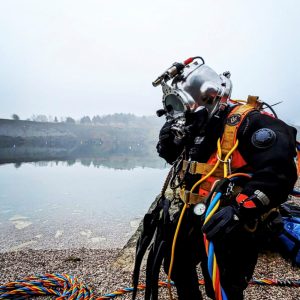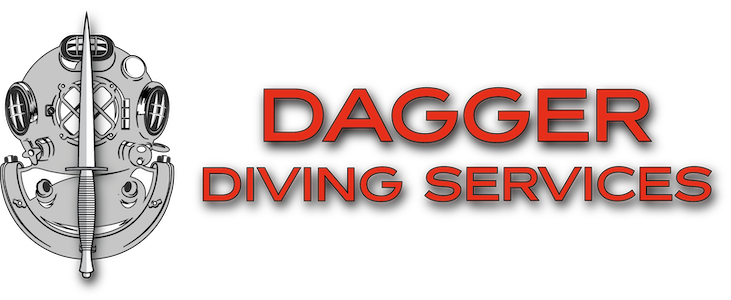
When clients contact us about underwater work, one question occasionally comes up: “Do you use commercial scuba for your diving operations?” The answer is always a firm no – and there’s a compelling safety reason behind this decision that goes to the heart of why Dagger Diving Services was established.
The founding principles of Dagger Diving Services
From day one, Dagger Diving Services was built on an unwavering commitment to safety. Our founders recognised that the commercial diving industry needed contractors who would never compromise on diver welfare, regardless of project pressures or budget constraints. This principle guides every decision we make, including our choice to exclusively use surface-supplied diving systems rather than commercial scuba.
Understanding the Difference: Commercial Scuba vs Surface-Supplied Systems
Commercial scuba diving involves divers carrying their breathing gas supply in Cylinders on their backs, similar to recreational diving but in industrial settings. In contrast, surface-supplied diving (also known as umbilical diving) provides breathing gas through a lifeline connecting the diver directly to surface-based panel varied and gas supplies.
While commercial scuba might seem more flexible and cost-effective, there is a reason why governing bodies advise against this method.
The safety concerns that steer our breathing methods
The Health and Safety Executive (HSE) and industry bodies including the Association of Diving Contractors (ADC) consistently highlight the risks associated with different commercial diving methods.
The HSE states in its Approved Code of Practice:
“Diving using surface-supplied breathing apparatus is the preferred method of carrying out diving operations under this ACOP because it is considered to be the safest method of diving for the vast majority of diving operations covered.”
Meanwhile, in its Consensus Standard, the ADC stresses that,
“Scuba procedures should not be used for the conduct of commercial diving operations except where it can be shown to be more safe and efficient than the alternative modes of diving.”
Commercial scuba present several issues that can compromise diver safety. When a scuba diver’s equipment fails underwater, they have limited backup options and finite gas supplies. Surface-supplied divers, however, maintain constant communication and unlimited breathing gas from the surface.
Commercial scuba divers face higher risks in several key areas:
- Gas supply interruption incidents
- Emergency ascent situations
- Communication breakdown with surface teams
These aren’t just operational considerations – they represent real safety risks that could affect our divers and their families. And every precaution matters when lives are on the line.
Why we’ll always use surface-supplied systems
Our surface-supplied diving operations provide multiple safety advantages that commercial scuba simply cannot match:
Continuous Communication: Our divers maintain constant voice contact with surface teams throughout every operation. This real-time communication allows for immediate response to changing conditions or emerging hazards.
Unlimited Breathing Gas: Unlike commercial scuba Cylinders with finite air supplies, our surface-supplied systems provide unlimited breathing gas for the duration of any job, removing time pressure that can lead to rushed decisions.
Immediate Emergency Response: Should any issue arise, our surface teams can immediately assist the diver through the umbilical system or implement emergency protocols without waiting for the diver to surface.
Enhanced Monitoring: Surface teams continuously monitor the diver’s condition and work environment, providing an additional layer of safety oversight impossible with commercial scuba operations.
Real-world Applications of safety standards
This commitment to surface-supplied diving has served our clients exceptionally well across various sectors. Whether we’re conducting underwater inspections for marine infrastructure, performing salvage operations, or carrying out construction work, our divers work with confidence knowing they have the safest possible life support systems.
Our approach means projects may require slightly more setup time than commercial scuba operations, but our clients consistently tell us the peace of mind is worth every minute. They know their projects are completed by divers using the safest available technology, backed by rigorous UK safety standards.
Dagger Diving Services’ safety-first ethos
Choosing not to use commercial scuba is about staying true to the values that founded our company. Every member of the Dagger Diving Services team returns home safely at the end of each working day, and our clients can be confident that their underwater projects are completed to the highest safety standards.
When you choose Dagger Diving Services, you’re choosing a contractor that puts safety first, always. Because in our business, there’s no project important enough to compromise on the fundamentals that keep our divers safe.
Contact us today to discuss how our safety-first approach to commercial diving can serve your next underwater project.

